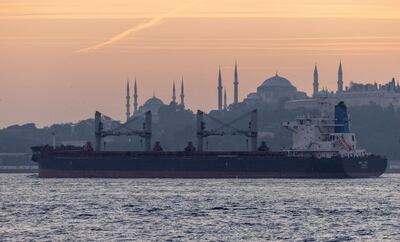A huge oil tanker logjam in Istanbul's Bosphorus Strait could spark a major geopolitical crisis, analysts have warned, as 20 tankers wait to progress through one of the world's busiest maritime trade passages.
The crisis was sparked by stringent new rules imposed by Ankara at the beginning of December which require proof of insurance before vessels can pass through Turkey's straits and dock at its ports.
Twenty oil tankers were waiting to pass through the Bosphorus Strait on Friday, while eight waited to cross the Dardanelles farther south, Tribeca Shipping Agency reported.
It comes amid a western oil cap on Russian crude at $60 per barrel, and an EU and UK ban on maritime services transporting the product, including to third countries.
The US and UK are among the western powers in talks with Ankara to ease the measures, which were introduced before the oil cap was announced.
Turkey has said the vast majority of ships waiting to pass through its straits are EU vessels heading to European ports, and has said its “routine checks” do not justify international pressure.
The queue, however, has prompted deep concern in oil and tanker markets and could develop into a “serious geopolitical crisis”, affecting many Kazakh tankers carrying domestic oil products, a top analyst told The National.
Ankara’s measures “seem to be unfairly penalising Kazakhstan, which has nothing to do with the EU bans or price cap against Russia, while also risking shortages in Europe”, said Vandana Hari, founder of Vanda Insights, which provides macroanalysis of global oil markets.

Under Turkey's new requirements, vessels must show full protection and indemnity insurance covering the duration of their transit through the Bosphorus Strait, or when calling at Turkish ports.
It came into place before the December 5 ruling by the EU, the Group of Seven and Australia, which bars shipping service providers from helping to export Russian oil unless it is sold at the capped price.
The new regulation is a bid to deplete Moscow's revenue and bring an end to its war in Ukraine.
Turkey has pushed back on growing international pressure and said it will need time to complete checks on incoming vessels.
It comes as Europe has raced to secure alternatives to Russian energy as winter sets in, leading to consumer cuts across the continent and spelling trouble for poorer nations.
“Ankara’s moves are thus pitching it against Astana as well as Brussels,” said Ms Hari.
“One presumes Turkey did not want to be seen as discriminating against Russia and hence decided to impose the stricter insurance checks broadly against all tankers crossing its straits.”
Turkey, along with the UN, brokered a vital grain agreement, assuaging fears of global food shortages amid the war in Ukraine.
The accord allows cargo ships carrying grain to depart from Black Sea ports previously blockaded by Russia, although Moscow temporarily withdrew from the deal after an attack on its fleet in occupied Crimea.
Turkish President Recep Tayyip Erdogan will hold new talks with his Russian counterpart Vladimir Putin on December 11.

In September, shipping was halted on the Bosphorus Strait after a vessel carrying 3,000 tonnes of corn from Ukraine ran aground.
The 19km-wide strait has millions of barrels of oil passing through its waters each day. Almost 700 million barrels of crude flowed through the vital passageway in the past year.
The International Chamber of Shipping, which represents more than 80 per cent of the world’s merchant fleet, said the Turkish notice “goes beyond” usual confirmations, “causing delay while clarity is sought on the scope of the new requirements”.
The association hopes for a “swift resolution”, it said in a statement shared with The National.
“As shipowners, our priorities remain the safety and well-being of our crews and the environment,” it said. “Insurance is absolutely vital to support our obligations while we continue to deliver the world’s energy supply.”
The EU Commission on Friday said that the price cap is not responsible for the backlog.
“This situation is not due to the G7 oil price cap, since there is, in any case, a 45-day wind-down period for seaborne Russian crude oil purchased before December 5,” a commission representative told Reuters.
Turkish authorities can check insurance “exactly the same way as before” only after the G7 transition period ends on January 19, the representative added.

